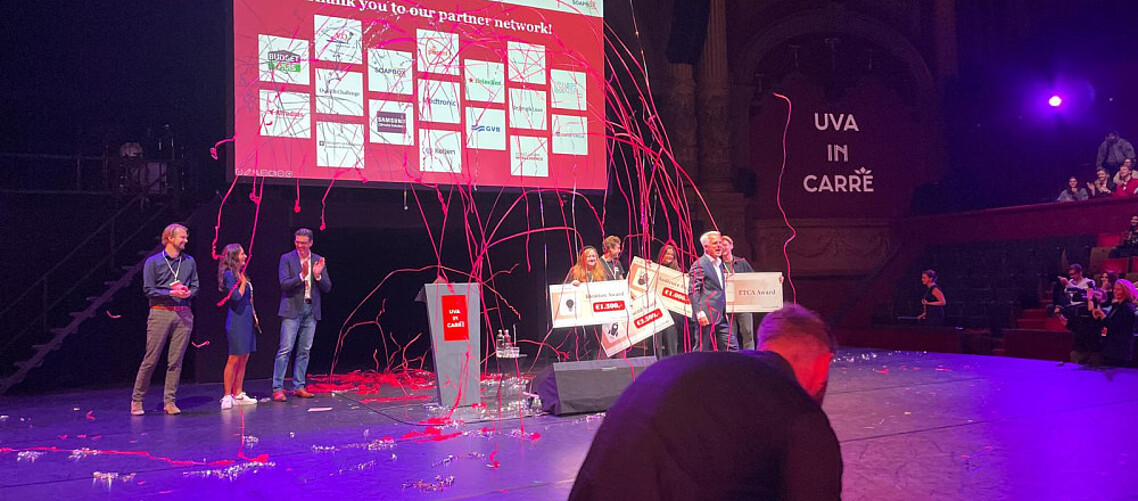The winner of the 2024 Dianne Bevelander Prize, Georgina Lara Booth has not let completing her second Masters of Law slow her down. Since winning the prize last year, the social impact entrepreneur has won several more awards, including the IDE Group’s Women’s Health Pitch session at the 2025 Innovation for Health event in Rotterdam on 3 April.
We connected with Georgina to explore what she has been doing since winning the prize in more detail.
Since you won the Dianne Bevelander Prize, you have been further recognised for your innovations. Can you share details of the pitch contests you have won or are in the running for?
I won the Women's Health Innovator Award for FEMALID at the Innovation for Health Conference at ICC De Doelen. I was also one of the winners of the NL Startup Pitch Competition for my AI LegalTech startup CaseCanvas to support mainly female victims of domestic and sexual abuse.
What it about FEMALID and CaseCanvas that you think makes them stand out?
CaseCanvas stands out because we’re applying AI not just to automate - but to empathise. While most legal tech tools focus on streamlining hard data and processes, we focus on the human story behind the case. Our platform empowers survivors of domestic and sexual abuse to safely document their experiences using AI-powered storytelling tools - all designed in collaboration with psychologists. We’re addressing not only a justice gap, but also a language, trauma, and trust gap. That’s what makes us different: survivor-centric, ethically built, and system-ready. Most AI tools process facts - we process lived experiences. That’s what makes CaseCanvas different.
Redesigning perspectives
Femalid stands out because we’re not just redesigning a medical device - we’re redesigning the perspective behind it. Most urinalysis tools used in healthcare today were created with the male body in mind, which leads to discomfort, inaccuracy, and exclusion for women. Femalid approaches medical design through a gender-equitable lens, creating female-friendly urinalysis solutions that are comfortable, dignified, and clinically effective for women. Our innovation is rooted in lived experience, backed by research, and driven by the belief that women deserve better in healthcare - starting with the most basic tools.
What do you hope to gain in the coming months through your recent prize that gives you access to innovation services from IDE?
With IDE Group, I hope Femalid will develop from a prototype to a fully validated and user-centered medical product with any support that they are able to provide. With my other prizes, I hope to further develop CaseCanvas.
Winning prizes has been both an incredible honour and a critical springboard. In the coming months, I hope to leverage the visibility and credibility it brings to secure the right partnerships - especially with institutions and investors who share our vision of ethical, survivor-centered technology and female-centered products. I’m also hoping it opens doors to connect with a mission-aligned CTO who can help us scale responsibly.
How can a female founder and innovator like yourself, who is focused on advancing gender equality though your work, be further supported?
Right now, our focus is on two key areas: securing financial investment to scale our impact, and finding a mission-aligned Chief Technology Officer. We’ve built a strong foundation with early traction, partnerships, and award recognition - but to grow sustainably and globally, we need the right technical leadership and capital partners who believe in ethical AI, justice tech, and women-led innovation.
How important has winning the Dianne Bevelander Prize been in your journey thus far?
Winning the Dianne Bevelander Prize has been incredibly meaningful - not just as recognition, but as affirmation. Professor Bevelander was a trailblazer for gender equality in leadership and business, and to receive a prize in her name felt like a clear signal: that the work we’re doing with CaseCanvas - combining AI, legal empowerment, and women’s rights - and FEMALID to advance equitable medical design truly matters. It’s also helped build momentum. The prize brought visibility and as a female founder working at the intersection of tech and justice, that kind of institutional support is both rare and powerful - and it’s given me the confidence to scale boldly.
You can read an in-depth interview with Georgina here.
Entries are now open for the 2025 Dianne Bevelander Prize. Details and the entry form are here.
